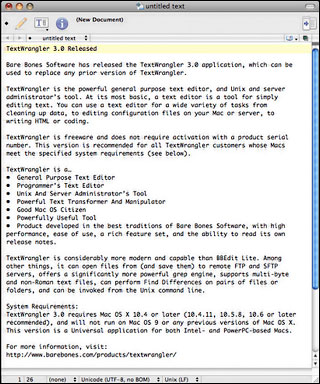
- #Bbedit compare two files upgrade
- #Bbedit compare two files full
- #Bbedit compare two files software
- #Bbedit compare two files windows
To enable BBEdit’s advanced features after the evaluation period is over, you will need to have an active BBEdit subscription.
#Bbedit compare two files upgrade
Using BBEdit in free mode costs you nothing, while providing an upgrade path to advanced features and capabilities. In “free mode”, BBEdit provides a modified set of features, which incorporates a powerful set of core features. After the evaluation period has expired, you can continue to use BBEdit for free, forever, with no nag screens or unsolicited interruptions.
#Bbedit compare two files full
BBEdit is 64-bit and compatible with macOS Catalina.Īn intelligent interface provides easy access to BBEdit’s best-of-class features, including: grep pattern matching search and replace across multiple files project definition tools function navigation and syntax coloring for numerous source code languages code folding FTP and SFTP open and save AppleScript and Automator support Unix scripting support text and code completion a complete set of robust HTML tools and more.īBEdit offers a 30-day evaluation period (beginning the first time you use it on your computer), during which its full feature set is available.ĭuring the evaluation period, BBEdit is fully functional.
#Bbedit compare two files software
There is a diffing app called Kaleidoscope that I’ve heard good things about, but I’ve never felt hampered by BBEdit.What does BBEdit do? BBEdit is the leading professional text, code, and markup editor for the Macintosh.Īs the "go to" tool for web site designers, web application developers, writers, and software developers, this award-winning product provides an abundance of high-performance features for editing, searching, and manipulation of text, code, and HTML/XML markup.Īs a replacement for TextWrangler, BBEdit is built by the same developers, using the same award-winning technology, and is identical to TextWrangler in every way you're used to. In this example, there’s only one line, but it’s broken into easily digestible pieces by BBEdit’s soft wrapping, and the exact spot at which the difference occurs is highlighted by the darker purple background. That would give me this nice two-pane output:
#Bbedit compare two files windows
If I wanted to use Cook’s extremely short lines.īut I’d be even more likely to open both files in BBEdit and use its Search▸Find Differences▸Compare Two Front Windows command. If I were OK with fmt’s default line length of 75 characters, or diff <(fmt -20 temp1.txt) <(fmt -20 temp2.txt) So I’d do diff <(fmt temp1.txt) <(fmt temp2.txt) What I like about fmt is that it defaults to breaking lines at spaces-no need for the equivalent of the -s option.

Whenever I’ve needed to reformat a text file to a given line length, I’ve used fmt. It’s used instead of piping when you have more than one input that needs to be fed to a command. The <() thing is a bit of clever shell scripting known as process substitution. Breaking the text into lines of only 20 characters is overkill, but it certainly is easy to see differences between lines when you have only 20 characters to scan through. The -w 20 option tells it to make the new lines no more than 20 characters long. The -s option tells fold to break at space characters instead of in the middle of a word. This is great for source code files, which are written by human beings and in which the lines tend to be short, but not so much for machine-generated files like JSON, XML, and some HTML files, in which line breaks may be few and far between.Ĭook’s solution for comparing long-lined files is to pass them through fold before sending them to diff: diff <(fold -s -w 20 temp1.txt) <(fold -s -w 20 temp2.txt)

The problem is that diff, the standard Unix tool for finding differences, tells you which lines are different. Cook brought up an interesting problem: what’s a good way to check for differences between files when the files consist of just a few (or maybe just one) very long lines?


 0 kommentar(er)
0 kommentar(er)
